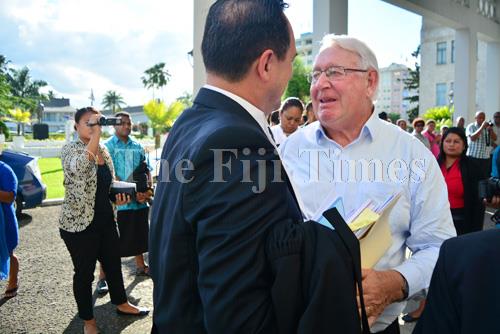In the slightly mad world of newspapers it is the editors who get the paper out every day, but it’s the publishers who keep the paper going. The publisher has to make the money that pays the journalists and get the papers to the readers – because that is the point.
In a good newspaper the publisher never tells the editor what to write – and doesn’t even know what tomorrow’s headline will be. But it’s the publisher who has to manage the fallout of a hard story – a large company threatening to pull out its advertising or some lawyer threatening to sue.
And then, when you live in a country with a bullying, dictatorial, free press-hating government, it’s not just your shareholders’ money or your bonus at stake – your choices may lead you to jail.
And that is what made Hank Arts a good publisher of a good newspaper. You can say what you like about The Fiji Times under the reign of Frank Bainimarama, but Hank held the line and backed his journalists. For more than two years he and his editor lived under the threat of imprisonment for sedition. Regardless of what he might truly be feeling, he smiled through it all.
Over the 16 years of Bainimarama rule I was one of a team of Munro Leys lawyers with our phones close at hand more or less every day for a Fiji Times call. We had to be ready for a search warrant, an arrest or a threat made against one of its staff. Why? Because The Fiji Times would not do what the Government told it to do. And Hank and his editor in chief, Fred Wesley, were the two who, every day, kept The Fiji Times that way.
Most days the harassment was low level, bureaucratic – and absurd. I still have a file of letters that used to arrive from the permanent secretary of Information, copied to the so-called “Media Industry Development Authority” (which, happily, never did anything) about the multiple sins of The Fiji Times.
The Fiji Times had not covered the prime minister’s tour of Kadavu. This showed The Fiji Times was anti-Government (actually, we weren’t allowed on the Government boat). A Fiji Times journalist had liked an anti-Government post on Facebook. This showed that everyone in The Fiji Times hated the Government. The Fiji Times had published a picture of babies with no milk powder in an evacuation centre. The Fiji Times should have reported that the prime minister had promised to fix it.
One day Hank received a complaint that The Fiji Times had mis-spelled the name of attorney-general Aiyaz Sayed-Khaiyum. Another caption had disrespectfully called him “Aiyaz”. The Fiji Times must perform to higher standards.
Hank replied. He pointed out that the Government’s own newspaper, Fiji Focus, had also mis-spelled Aiyaz’s name that week – and the names of two other officials as well. So the permanent secretary wrote a grovelling letter of apology to the attorney-general, which for some reason she copied to Hank.
Hank and I would laugh our way through these stupid complaints. Finally, though, we decided that they were wasting too much time. So Hank wrote to the permanent secretary. He told her that, in the interests of transparency and accountability, he would reprint all her future complaint letters in The Fiji Times, together with his replies. We never received another one.
But then things became not so funny. In 2016, Nai Lalakai, the iTaukei-language sister paper of The Fiji Times, printed a virulently anti-Muslim opinion article. Nai Lalakai’s editor was stupid to publish it (and rightly lost his job for it). But it was the Government’s chance to come for the leaders of The Fiji Times, even though neither of them had approved the article or even knew it was coming.
Hank and Fred were prosecuted. Was it under the Government’s famous “media development” decree? No. They were charged for sedition, for which they could be imprisoned for up to seven years.
We all know now that in 2018 the Fiji Times team was acquitted. The Director of Public Prosecutions appealed against the acquittal. The appeal is still in the court lists so, for now, I will keep to myself the rest of my opinions on the case, and the decision to prosecute at all.
Hank never doubted that The Fiji Times and its legal team would win. If privately he had his doubts, he never let on. And ultimately, in a moment that was emotional and gratifying for all of us, he was right.
Today our people regularly blast their political leaders for their mistakes. They are helped along by a news media freed from controlling laws, freed from a Government which told its own outlets what to say and do and which bribed others with exclusive advertising contracts to write sickly sweet stories about “Messiahs” and the like. We’re also free from stupid and bullying letters from the Ministry of Information. If we value our freedom at all, we must remember those times so we do not repeat them.
It’s the brave editors who are the first to be recognised for holding the line against dictators. But brave editors have to be backed, all in, by brave publishers. And Hank Arts was one of those.

